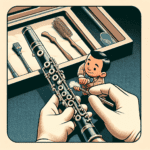Taking Care of Your Clarinets
Every clarinet player knows that a well maintained instrument is key to producing genuine, stellar sound. But how does one keep their instrument in top-notch condition? Here are some practical tips for clarinet players' instrument maintenance that will help prolong the life and performance of your beloved clarinet. Think of it as giving your best friend a good bath after a muddy day—everyone will notice the difference!
1. Regular Cleaning is a Must
After a long session of playing, your clarinet is bound to get dirty—it's just how it goes! Set up a cleaning routine after every use. Wipe down the body with a soft, lint-free cloth to remove moisture from your breath. This step is crucial because moisture inside your clarinet can lead to mold growth in those delicate pads!
Don't forget about the mouthpiece. It's often overlooked, but remember, this is the part that goes in your mouth! Clean it with warm water and a gentle brush to prevent residue or bacteria buildup. Make sure to rinse and dry it thoroughly.
2. Proper Assembly and Disassembly
Treat your instrument with care! When putting your clarinet together or taking it apart, be gentle. Hold the barrel, not the keys, as they're fragile. When connecting pieces, avoid twisting or forcing them—they should fit together smoothly, like two pieces of soft butter.
| Do | Don't |
|---|---|
| Hold the barrel when assembling | Grip the keys |
| Gently connect pieces | Force or twist parts together |
| Take your time | Rush the process |
3. Storage Matters
After practice, where should your clarinet go? Ideally, place it in a hard case to protect it from temperature changes and accidental bumps. Avoid laying it flat or leaning it against a wall—it's like leaving a guitar propped against a couch; one nudge and down it goes! Store your clarinet in a cool, dry spot, away from direct sunlight, and if possible, keep it upright.
4. Watch for Moisture
Here's a key word: Swab. Use it after every play to prevent moisture from hanging around. The swab absorbs moisture and removes debris that could clog your instrument. If you're not sure which type to use, look for ones made specifically for clarinets. They're usually soft fabric that won't scratch the inside, giving you peace of mind while cleaning.
5. Regular Check-Ups
Just as a car needs regular maintenance, your clarinet needs check-ups too! Occasionally, take it to a skilled technician for a full maintenance check. They can fix and replace pads and springs, making sure everything works properly. This proactive step can save you money in the long run and keep your clarinet sounding beautiful.
6. Tuning Your Clarinet
Make tuning a part of your practice routine. Get a good tuner or app to ensure you're playing in tune. Sound quality can change with temperature, especially outdoors. If you're taking your time warming up, it's okay to be the first one ready; it's your job to make sure you're in tune!
7. Invest in Quality Accessories
You wouldn't put cheap tires on a Ferrari, right? Similarly, get good quality reeds, ligatures, and mouthpieces to get the best performance from your clarinet—especially if it's a Martin Freres! High-quality accessories can really improve your tone and projection, leading to a smoother performance.
8. Use a Reed Case
Have a system for storing your reeds to make them last longer. Remember, they're delicate and need proper care. Keep them in a ventilated case with a moisture-control pack. This helps maintain their quality for as long as possible. Replace them regularly, especially when you notice they're not playing well or have become too soft.
9. Humidity Control
Think about using a hygrometer to check humidity levels. If it's too damp or dry, it can affect your instrument's pads and how it plays. Try to keep a steady level that's not too humid or too dry. If you need extra humidity control, consider getting a good humidifier for your case during dry months.
10. Experiment and Learn
Every clarinet is unique! Embrace your instrument's special qualities and explore what it can do. Don't be afraid to try different reed strengths or mouthpieces until you find what makes your sound pop. Ask other musicians for advice and tips—you might discover new techniques and sounds!
In conclusion, taking good care of your clarinet is key to making sure it lasts and sounds great during your performances. By following these tips, you'll create the perfect environment for your clarinet to make its best music! And who wouldn't want to hear a Martin Freres clarinet at its finest? Happy playing!







